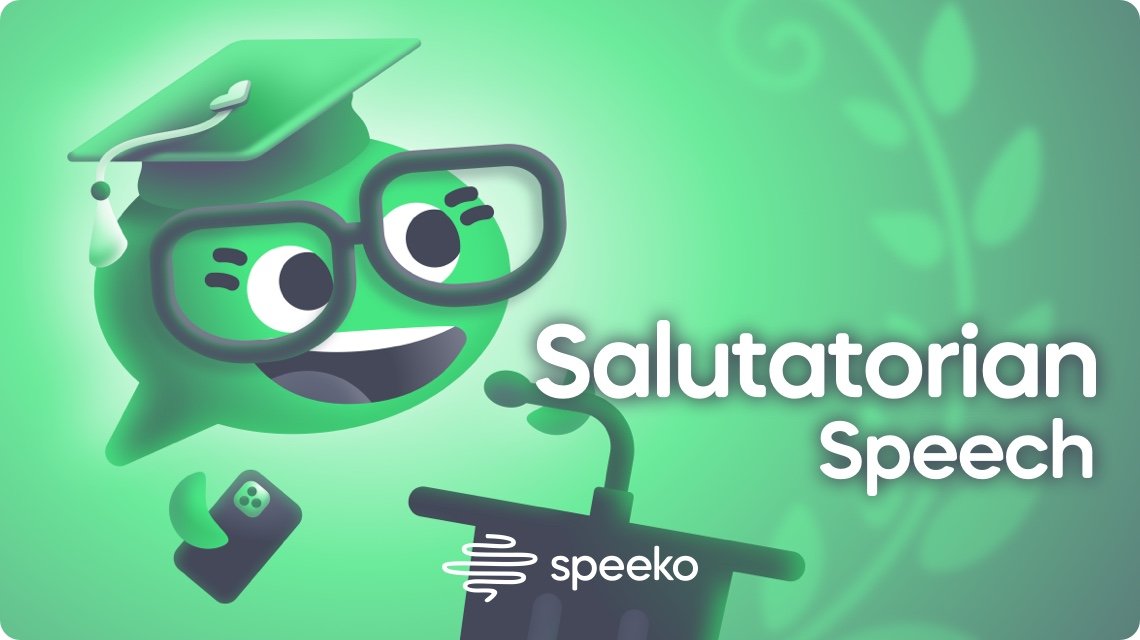How to Give a Winning Salutatorian Speech (Ideas, Tips, and Examples)
Download Speeko (iOS/macOS) to start our Graduation Speeches course for free!
Well, congratulations are in order! As the salutatorian, you’ve truly accomplished something special in your academic journey. You’ve put in the hard work to earn your esteemed rank and have been handpicked to give a speech at your upcoming graduation ceremony. Now that’s something to be proud of.
This speech of yours is a rare opportunity to speak to your classmates, family, friends, teachers, and fellow graduates. It’s a chance to share your thoughts on this momentous occasion. We’re going to discuss some key steps to help you craft a truly excellent salutatorian speech.
Giving a speech can be daunting. But with the right approach, it can be a truly enjoyable and rewarding experience.
So, let’s get started.
Salutatorian vs. valedictorian speeches: What’s the difference?
Traditionally, the salutatorian’s role is to welcome everyone to the graduation ceremony on behalf of the graduating class.
While the valedictorian’s speech is directed toward your classmates and given toward the end of the ceremony, your speech is directed toward the entire audience—including friends, family, and teachers—to welcome them to this special event.
As the salutatorian, you might also introduce other speakers and representatives participating in the ceremony.
💡 Pro tip: Work with the valedictorian to make sure your speeches aren’t too similar.
So what should I say?
Use the Past-Present-Future framework as your guide.
Theme: What’s the main message that ties your speech together? If the graduation already has a theme, include it.
Opening: Thank your audience for being present. Introduce yourself.
Key Idea 1: (Past) Share a story, memory, or observation highlighting your gratitude for the people who have supported you and your classmates.
Key Idea 2: (Present) Talk about what makes today special.
Key Idea 3: (Future) Talk about how you look forward to the rest of the ceremony and the years ahead.
Closing: Give a call to action, such as encouraging your audience to enjoy the ceremony. Tie it back to your theme.
💡 Pro tip: Your graduation speech should include at least 1 or 2 stories. Stories will make your speech personal and engaging.
Download Speeko (iOS/macOS) to draft notecards and get A.I. feedback on your salutatorian speech.
What ideas should I include in my salutatorian speech?
Your speech should be a true reflection of who you are and what you stand for. And to make that happen, here are a few key ideas you'll want to keep in mind:
Gratitude: First and foremost, show your gratitude. Express thanks to the people who have supported you: your parents, your teachers, your classmates, and your friends. Let them know just how much their support has meant to you.
Reflection: Take some time to reflect. Talk about the significance of the day’s events or observations that you’ve made. And don’t forget to touch on the lessons you’ve learned along the way!
Inspiration: Share your aspirations and how the people in attendance have inspired you.
Fun: A little laughter can go a long way in breaking the ice and connecting with your audience. If you’re not naturally funny, that’s okay! This doesn’t mean you have to tell a joke or share a funny story. You can make your speech fun by using a lively tone and engaging body language.
Advice: Last but not least, offer some advice. You’ve gained plenty of wisdom from your experiences and the people who have influenced you. So take this opportunity to share some of that knowledge with your classmates.
How long should a salutatorian speech be?
The length of a salutatorian speech can vary depending on your ceremony. But as a general rule of thumb, you’ll want to aim for a speech that’s around 5 to 10 minutes long.
Now why is that? Well, you’ll want to give yourself enough time to cover all the main ideas you want to share. But at the same time, you don’t want to drag on for too long and bore or tire your audience. So finding that sweet spot is key.
💡 Pro tip: Time your speech beforehand. And don’t just do it once. Rehearse it several times to make sure it flows smoothly and fits within the time limit. That way, you can go into your graduation ceremony with the confidence of knowing you’ve got this speech thing down pat.
How can I make my salutatorian speech memorable?
Let’s talk about how to make your salutatorian speech truly memorable. Here are some tips to help you achieve that goal:
Connect with your audience: When you kick off your speech, take a moment to acknowledge your audience on a personal level. Make eye contact, and speak with conviction and passion. You can even address faculty by their names. This will make your audience more engaged with your message.
Share a story: Stories are powerful tools to capture the attention and emotions of your audience. Share a personal story that your audience can relate to. This can help make your message more memorable and impactful.
Use humor: Humor can be a great way to lighten the mood and make your speech more enjoyable. Use appropriate jokes, puns, or humor that relates to your graduation or your classmates. But remember to keep it respectful and appropriate for your audience.
Share a quote: Quotes are a great way to add wisdom and inspiration to your speech. Use a quote from a famous person, book, or movie that relates to your message and that your audience can remember. This can help reinforce your theme and make it more memorable.
What are some tips for delivering a successful salutatorian speech?
Delivering a great salutatorian speech requires a little bit of preparation and practice. So, here are some tips to help you nail your delivery:
Prepare in advance: Don’t procrastinate! Write it down, rehearse it several times, and time it to ensure it fits within the time limit.
Speak clearly and slowly: Avoid mumbling or jumbling words mumbles. Keep your chin up, speak slowly enough for people to understand you, and use pauses to highlight important words.
Use your body: Your body language can help add some oomph to your speech. Use your hands, your face, and your posture to help express your emotions and message. And don’t forget to make eye contact to connect with your audience!
Manage your nerves: Don’t let nerves get to you. It’s normal to be a little jittery before speaking, but try to relax by taking deep breaths, visualizing yourself rocking the speech, and focusing on your message.
Use the “you”: When you use “you,” “we,” and “us,” you bring your audience closer to you and make them feel included. It’s a simple technique, and it makes a powerful difference. So when you review a draft of your speech, look for how you can use “you” as often as possible.
Practice: Practice makes perfect, my friend. Practice your speech several times before the graduation ceremony to get comfortable with your message and delivery. Use feedback from others to improve your speech.
Be yourself: Don’t try to be someone you’re not. Speak from the heart, stay true to your values, and let your personality shine through. Remember, you’re the salutatorian for a reason!
Download Speeko (iOS/macOS) to get A.I. feedback on your speaking style.
How can I make my salutatorian speech meaningful?
Delivering a meaningful salutatorian speech is all about being true to yourself and connecting with your audience. Here are some tips to make your speech meaningful:
Stay positive: Focus on the good things that have been happening. Your goal is to make everyone feel welcome and excited.
Be inclusive: Include everyone in your speech. Use language that is inclusive and respectful to all members of your audience.
Show empathy: Try understanding and connecting with your classmate’s experiences and emotions. What would they want to hear about? What would make your speech meaningful to them? Share stories that resonate with them and show that you care about their perspective. Use emotional language to really connect with them. It can be as simple as naming the emotion: “We’re all anxious about what’s to come…” or “I know you all are just as excited about the future as I am….”
What should I avoid when writing a salutatorian speech?
When you’re putting together your salutatorian speech, there are some common mistakes and pitfalls that can detract from your message and delivery. Here are some tips to help you avoid common mistakes:
Avoid clichés: Steer clear of overused phrases that don’t have any originality or authenticity to them. Use your own words and experiences to share your message.
Stay humble: You don’t want to come across as arrogant or condescending when talking about yourself or your classmates. Keep a humble and respectful tone that shows gratitude and appreciation.
Skip controversial topics: You don’t want to talk about anything that might offend or divide your audience. Keep things positive and inspiring so that everyone can relate to your message.
Mind your language: Don’t use any inappropriate language, jokes, or stories that could offend or embarrass anyone in your audience. Keep things respectful and appropriate for all ages and backgrounds.
Don’t ramble: Stay focused, and don’t go off on a tangent in your speech. Keep things concise and focused on your main ideas to ensure your message comes across clearly.
What are some creative ways to start a salutatorian speech?
When it comes to writing the opening of your salutatorian speech, it can be a bit of a challenge to set the tone for the rest of your speech. But don’t worry, here are some creative ways to get you started:
Share a quote: You can start your speech with a powerful quote that relates to your message and sticks in your audience’s minds.
Use humor: Start with a funny story, joke, or pun that relates to your graduation or your classmates. Just be careful not to go overboard with the humor.
Tell a story: Share a personal story. It can be from your earlier years in school or even just last week!
Ask a rhetorical question: Start your speech with a rhetorical question that prompts your audience to think about your message and gets them engaged.
Use a metaphor: Start with a metaphor that relates to your message and paints a vivid picture in your audience’s minds.
What are some topics to discuss in a salutatorian speech?
Choosing a theme for your salutatorian speech can be a real head-scratcher. But no worries, here are a few ideas that might just do the trick. The key is to weave stories into your speech. Stories that are specific and vivid will keep your audience engaged and entertained. Let’s take a look at some possible themes:
Gratitude: Think of someone who had a life-altering influence on your academic journey—maybe a teacher, parent, or friend—and share a story about them. You can even reveal a little “secret” about this person that you think the audience should know. This will give your speech a more intimate feel.
Cherished memories: Ah, memories. They can be a great way to connect with your audience. Share one of your favorite moments that you and your classmates have shared together. Try to find a common theme among those memories that can become the theme for your entire speech.
Achievements: As the salutatorian, you’ve achieved a lot, and so have your classmates. So why not celebrate those achievements and reflect on the hard work, dedication, and perseverance that led you all to this moment? Use your own journey as an example, and inspire your classmates to continue pursuing their own achievements.
Change: Reflect on the changes and challenges that you and your classmates have faced during your academic journey. For example, how did the pandemic impact your class? Or how did major advances in technology bring your class closer together?
The future: Share your aspirations and goals for the future, and encourage your classmates to pursue their own dreams and make a positive impact on the world. This will be a nice contrast to the stories you tell about the past.
What is the best way to end a salutatorian speech?
Ending a salutatorian speech is just as important as starting it. Your closing should set the tone for the rest of the ceremony. Here are ways you can end your speech:
Tie it back to your theme: Take a moment to summarize your key ideas and highlight the key takeaways of your speech. This will help reinforce your message and ensure that your audience remembers it.
Use humor: End your speech with a lighthearted joke or pun that leaves your audience with a smile on their faces and wraps up your message nicely.
Express gratitude: If you haven’t thanked people earlier in your speech, take a moment to thank your fellow graduates, your teachers, your family, and anyone else who has supported you throughout your academic journey. Showing gratitude and appreciation can create a positive, uplifting ending to your speech.
Encourage action: Inspire your audience to take action based on your message. You could encourage them to enjoy the ceremony.
Share a quote: End your speech with a powerful quote that relates to your message and that your audience can remember. Leave them with a thought-provoking idea.
How can I find inspiration for my salutatorian speech?
Finding inspiration for your salutatorian speech can be challenging, but there are many ways to get inspired. Here are some tips:
Reflect on your experiences: Look back at your journey, and think about the moments that made a real impact on you. Your personal experiences, thoughts, and values are all great sources of inspiration.
Just start writing! Grab your phone (or a pen and paper) and jot down all the ideas that come to your mind, no matter how silly or impossible they may seem. You never know—one of those ideas could turn into a great speech!
Talk to people: It’s always a good idea to bounce your ideas off of others. Talk to your family, friends, and teachers to get their perspectives and insights. They may have valuable ideas and feedback that can help you shape your speech.
Research: Take a listen to other salutatorian speeches, commencement speeches, and inspirational speeches to get some ideas. See what works and what doesn’t.
And don’t forget to have fun with it! This is your moment to shine, so enjoy it and make the most of it. Good luck!
Download Speeko (iOS/macOS) to brainstorm stories for your salutatorian speech.
Examples
-
Theme: Community
Opening: Good afternoon, esteemed faculty members, parents, families, friends, and fellow graduates. As the salutatorian, it’s an honor to welcome you all to our graduation ceremony. My name is [Name]. Today marks the end of a chapter in our lives and the beginning of a new one.
Key Idea 1: (Past) 4 years ago, we were just a bunch of freshmen with no clue of what we were doing, trying to find our way through the maze: which classes to sign up for, which extracurriculars to join, which friend group to try to fit into. And then, before we knew it, we were seniors. We had a sense of purpose, trying to leave our mark on this school. We’ve had countless memories, from finals-week jitters to the carefree days of senioritis. And we made it through, and here we are today, ready to take on the world.
As a theater kid, I spent a lot of my time either rehearsing for a play or performing in one. During our first year, I was cast in our school’s production of “Grease.” I was thrilled. I had always wanted to play Sandy, and my dream finally came true. However, on opening night, disaster struck. As I walked onto the stage, I slipped on a piece of confetti. But I didn’t fall flat on my face. No, even worse: I forgot my line. The silence in the auditorium was deafening. My heart was pounding up to my ears. And for a moment, the entire world froze. But then, the person playing Frenchy ad-libbed a line to get us back on track, and the show continued on.
Later, I was talking to my parents about it, and they had no idea that anything had gone wrong.
Key Idea 2: (Present) Looking back on that moment, I realize that school and even life are filled with moments like that. We all stumble at different points, and we have to be there for each other. School isn’t just about textbooks. It’s about the communities we discover outside of the classroom. This is how we grow into the best versions of ourselves. No matter how long our friends stay in our lives, they permanently shape our worldview. As Oliver Wendell Holmes once said: “One’s mind, once stretched by a new idea, never regains its original dimensions.”
Key Idea 3: (Future) As for the future, who knows what it holds? But one thing is for sure: we will make the most of it. We have all worked incredibly hard to get to where we are today, and I have no doubt that we will continue to do so in the future. We’ll scatter around the world and become part of different communities. And the world will never regain its original dimensions.
Closing: So, to everyone here, I urge you to allow yourself to slip on the confetti, forget your lines, and—most importantly—let people be there for you. Learn from your communities, grow with your communities, and maybe even help build one of your own. Congratulations, Class of [Year], and let’s all enjoy today as a once-in-a-lifetime celebration.
-
Theme: Perseverance
Opening: Good afternoon, fellow graduates, esteemed faculty, family, and friends. My name is [Name], and I am honored to welcome you all to this momentous occasion: our graduation. And I can’t help but feel a sense of nostalgia for the memories we’ve made and a sense of excitement for the future that lies ahead of us.
Key Idea 1: (Past) In the past four years, we’ve laughed, cried, learned, and grown together. We’ve experienced moments of triumph and moments of defeat.
One of the highlights of my school experience was being a basketball player. From early-morning practices to late-night games, it has taught me some valuable life lessons.
During our junior year, we were in the middle of a crucial game. With only a few minutes left on the clock, I had the ball in my hands, and I was ready to make the game-winning shot. I could hear the cheers and screams of my teammates and fans in the background. But then, out of nowhere, I tripped and fell, losing the ball and my chance to win the game.
I felt defeated and embarrassed. It was such a low point. But Coach [Name] later told me this: “Life is unpredictable, and sometimes, things don’t go as planned. But it’s how we react to those moments that define us. It’s all about perseverance.”
Key Idea 2: (Present) Today, we’re ready to take on the next chapter of our lives. Today marks the culmination of years of hard work, dedication, and perseverance. Today is a day we honor our teachers, administrators, and staff who have guided and supported us throughout our journey. Today represents a significant milestone in our lives and the beginning of a new chapter.
Key Idea 3: (Future) And in the future, I can’t wait to see where our journeys take us. Some of us will go on to college, others will enter the workforce, and some will serve our country in the military. Someone will become an entrepreneur, artist, or athlete—or all of the above. Whatever path we choose, I’m confident that we can all achieve greatness. And we will undoubtedly have many moments of triumph as well as many moments of defeat. It’s how we react in those moments that will define us. Whatever we do, I hope we never forget the lessons we have learned here at [School name] and continue to grow from our experiences.
Closing: Thank you to our friends and families for your unwavering support. And to my fellow graduates, I am honored to have shared these four years with you all. Congratulations, Class of [Year]! Let’s make the future bright!
-
Theme: Appreciate the small moments
Opening: Good evening, fellow graduates, esteemed faculty, proud parents, and distinguished guests. It’s an honor to stand before you as the salutatorian of our graduating class. My name is [Name]. I’d like to warmly welcome everyone in attendance and express my gratitude for being part of this memorable occasion.
Key Idea 1: (Past) I’d like to take a moment to reflect on our past experiences. Four years ago, we came into these hallways as timid freshmen, unsure what the next four years would bring. We stumbled through our first day of school, struggling to find the paths to our classes. But soon enough, we found our way and began to thrive.
One of my fondest memories is when I was a sophomore and sat down in a classroom for a final exam. I sat down, confident in how well I prepared, only to realize I knew nothing about what was on the exam sheet. After frantically flipping through my notes, I looked up to see the wrong teacher staring at me from the front of the room. Then I looked around and realized I was surrounded by seniors! I had walked into the wrong classroom. It was a humbling experience, to say the least. And it was a small moment, but it’s one that I’ll never forget.
Key Idea 2: (Present) Looking back, I realize now that it’s not just the academic achievements that make our time here so special. It’s these small moments, the laughter shared with our friends, the support of our teachers, and the sense of community that make this an unforgettable experience.
Today is a day we’ll remember for years to come. We’re filled with excitement, anticipation, and a tremendous sense of accomplishment. It’s a day that marks the end of one chapter in our lives and the beginning of a new one, a day where we celebrate the culmination of years of hard work, dedication, and perseverance. Today, we’ve come together as a [School mascot] community, ready to take on the world with confidence and determination. It is a day that reminds us of the limitless potential we hold within ourselves and the boundless opportunities that lie ahead.
Key Idea 3: (Future) As we stand on the cusp of our future, the world is our oyster. We have been given the tools to succeed, and now it is up to us to utilize them to the best of our ability.
We’re moving forward into the next phase of our lives, and we can’t forget the values and lessons we have learned during our time here. The friendships we’ve made, the teachers who’ve guided us, and the experiences that have shaped us—these will always be a part of us.
Closing: So, to my fellow graduates and everyone who has come here to support us, let us celebrate our accomplishments, cherish the small moments, and look forward to a bright future. Thank you, and congratulations to the graduating class of [Year].
Speeko for graduation speeches
Tap into the power of A.I. coaching to unleash your full speaking potential. Use Speeko to prepare, write, and organize your salutatorian speech. From gathering your stories to using humor, you’ll strengthen your skills and receive invaluable feedback on key areas of your speaking style.









